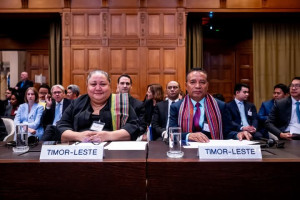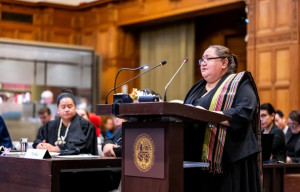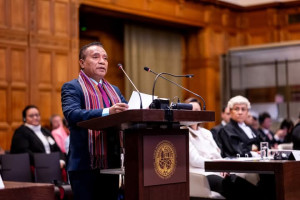Timor-Leste Advocates for Small Island States' Rights at the International Court Amidst Climate Change

Timor-Leste shared (12/12) its perspective as a Small Island Developing State (SIDS) and Least Developed Country (LDC) alongside 100 other States presenting submissions before the International Court of Justice (ICJ), in the Hague, in the Netherlands, on its landmark Advisory Opinion on the obligations of States with respect to climate change. 
The Representative for Timor-Leste, the Chief of Staff to the Prime Minister and Chief Executive Officer of the Land and Maritime Boundary Office (LMBO), Ms. Elizabeth Exposto, emphasised that while all nations share a common duty to combat climate change, their responsibilities must reflect historical contributions to the problem and their respective capacities to address it.
Ms. Exposto reiterated why the principle of common but differentiated responsibilities and respective capabilities in fighting climate change is so fundamental.
She highlighted that the climate change response must not deny LDCs, including Timor-Leste’s right to development and to develop their natural resources, in accordance with the principles of self-determination and permanent sovereignty over natural resources. 
Timor-Leste’s Ambassador-at-Large for Climate Affairs, Mr. Adão Barbosa, in his remarks reminded that “Developing States have already paid a high price for the climate crisis. We cannot continue to be “short-changed” at the expense of our poverty alleviation and sustainable development. We cannot ask SIDS and LDCs to use the resources needed for their socio-economic development to finance climate change responses, especially when their contribution is so negligible.”
Meanwhile, Timor-Leste’s Legal Counsel, Eran Sthoeger, wrapped up Timor-Leste’s submission to the ICJ, focussing on the United Nations Framework Convention on Climate Change (UNFCCC), Article 40, which states that the climate treaties’ implementation shall consider the position of States with economies that are “highly dependent on income generated from the production, processing and export, and/or consumption of fossil fuels”.










































